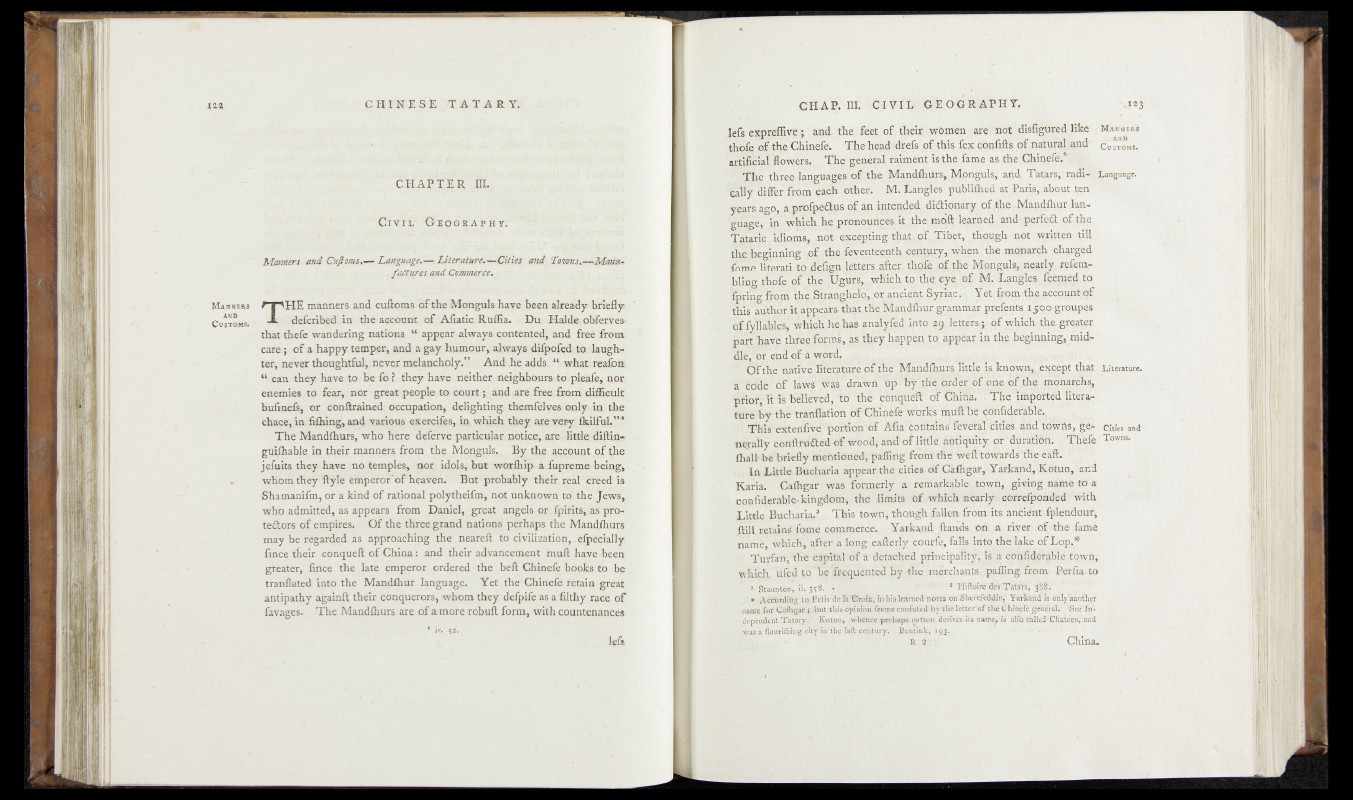
1 2 3
Markers
AND
Customs.
CH AP TER IK-
Crv il G e o g r a pkVr.'
Manners and CufiomsLanguage,— Literature.--*,Okies and ‘Towns.—>Manu-
. failures and Commerce.
THE manners and cuftoms of the Monguls have been already briefly
defcribed in the account of Afiatie RutBa. Du Haldes oMerfees»
that thefe wandering nations “ appear always contented, and free front
care j of a happy temper, and a gay humour, always difpofed talaugh-v
ter, never thoughtful, never melancholy.” And he adds “ what reafon
“ can they have to be fb ? they have neither neighbours: to pleafe, nox
enemies to fe^r, nor great people to court; and are. free from difficult
bufinefs, or conftrained occupation, delighting themfeives only in the
chace, in filhing, and various exereifes, in which they are very Ikilful.’**
The Mandthurs, who here deferve particular notice, are little diftin?-
guifhable in their manners from the. Monguls. By the agcognt of tfie
jefuits they have no temples, nor idols, but worlhip a fupreme beings
whom they ftyle emperor *of heaven. But probably their, real cfeed |a
Shamanifm, or a kind of rational polytheifm, not unknown to* the jews,
who admitted, as appears from Daniel, great angels or fpirits, as protestors
of empires. Of the three grand nations perhaps the Mandthurs
may be regarded as approaching the neareft to civilization,, efpecially
fince their conqueft of China: and their advancement mull have been
greater, fince the late emperor ordered the beft Chinefe books to be
tranflated into the Mandfhur language. Yet the Chinefe retain great
antipathy againft their conquerors, whom they defpife as a filthy race of
lavages. The Maridlhurs are of a more robuft form, with countenances
'• t*.
lefr
lefs expreffivp’i, and. the*feet, of- their- women ares not disfigured like Manser*
thole of the Chinefe. T^ie bead djrefs of this*f^fc©nfifts of natural and' cW omi.
artificial flowers^ Tlje general raiment isfhe fame ^ (he -Chinefe.*, ;
The three languages of the ^ ^apdfhiars*, and Tatars, radi- Language,
tally du&rYrorn each other. Tingles published at Paris, a^out .ten ''
years ago,( a nrofpetjys ©|, an frijtepded, dictionary, of ||]p ^^Lfhur .lan-
'guage, in which he pronounces b.thempflf k^rnegL p d ;, jierfea of-4%
Tat-anq' idioras^ no\ excegtirng. tha£f,pf, Tibet, Citfeigh not written till
the-beginning ..of ,the, feventeentfr century, w,ken, the monarch -reharged
b in e lite ra t i jp^^gn f r fer%-
bling .tho^mthe nUgur^tI wni^h t^h.^/ye.of M. Lang^/ee.med to
'Iprlng Irom^the^Strangh^loylmigjajt.jS^<|c^ ' Yet^qi^the accountrnf
rthis ^'av^pr-k^ea^that. tge^andl^rVa^mfr pi-efents 15.0,0 grpupes
of fyllaiie% lwhlG^V.he(has.^naiyJ^d jpto 2^T,l.etjtpyacj ,qf which. thg.,g-reater
part have Jhf^ftyras,^ they happen,,^ apppar .in .the, (begiqning^-midy
ehdppa word, s c
'l; Of th e n a t iv e mefature ofme Mandlhuiti little is known), except that Literature,
a laWs*wis'drawif’ up-by the'order 01 jo^ofifre ^dnarjihs^
prior, it Is believed, tb the tfptiqufcil of Ch^. .The imported literature
by the trShflation of Chinefe works'mufthe^bnfidefrablfe.. '
«sSedfeve ^oitton'df Afra^otftalfts'fbYaaf biirakaridt towljs, ge± cities and
»^raly eotifttmfred of Wood, and-of Iitftld antiquity cnf'dliratidk /Tfrelb Towns*
lhalbbfe!t»ie% mefttl©hed, faffing frofrfkk; weft'dfrwhMs’ffl'e-esjff.
I^ Litfrd Baacharia ^pfiar Ad .eiries. df Olfligaf, Yarkand, Kbtun,Wd
Raria.1~ Cafhgar was formerly a rema,rk|ble,.,to'wn, giving Mme tO >a
confiderahle- kingdPm,. the -limits Pf which nearly a*ir«%asded ' ’with
r"jfi A n f This toWnf thQUghiaflenfrom'its' ancidrit fplepdour,
epmtnerce.. Yarkand ftands ton a river
name, which, after a long eafterly courfe, rails 'into the lake of’Loja.*
■ Tuffah, the capital of a detached principality, is a confiderabll town,
which', fifed to be frequehtecl ,by the merchants palling, from Perfia. to
* Staunton, ii. 3^8. , . ■ 13 ;kiftoire: des-Titars:, JSS. ' '
According.to Petis .deraiSro&.finfis’leai-ned nStes'bfliSiierefeddiri^ Yarkand' is oiiIy;'anotlier
,name for :.Qa(hg.ar.i; but this; opjnjp^feiiis eonEiited' by tfife'letter' of t fe ffiMOTfeigede;-a^’ ' See In -
dependent Tatary.' Kotun-, wlietice perbapa qottoti derives it* h'a&e. 'is alfo called' Ch'ate’en, and
was a flib.urithing city in'the laft century. Bentinky .193.
•.R af| China.